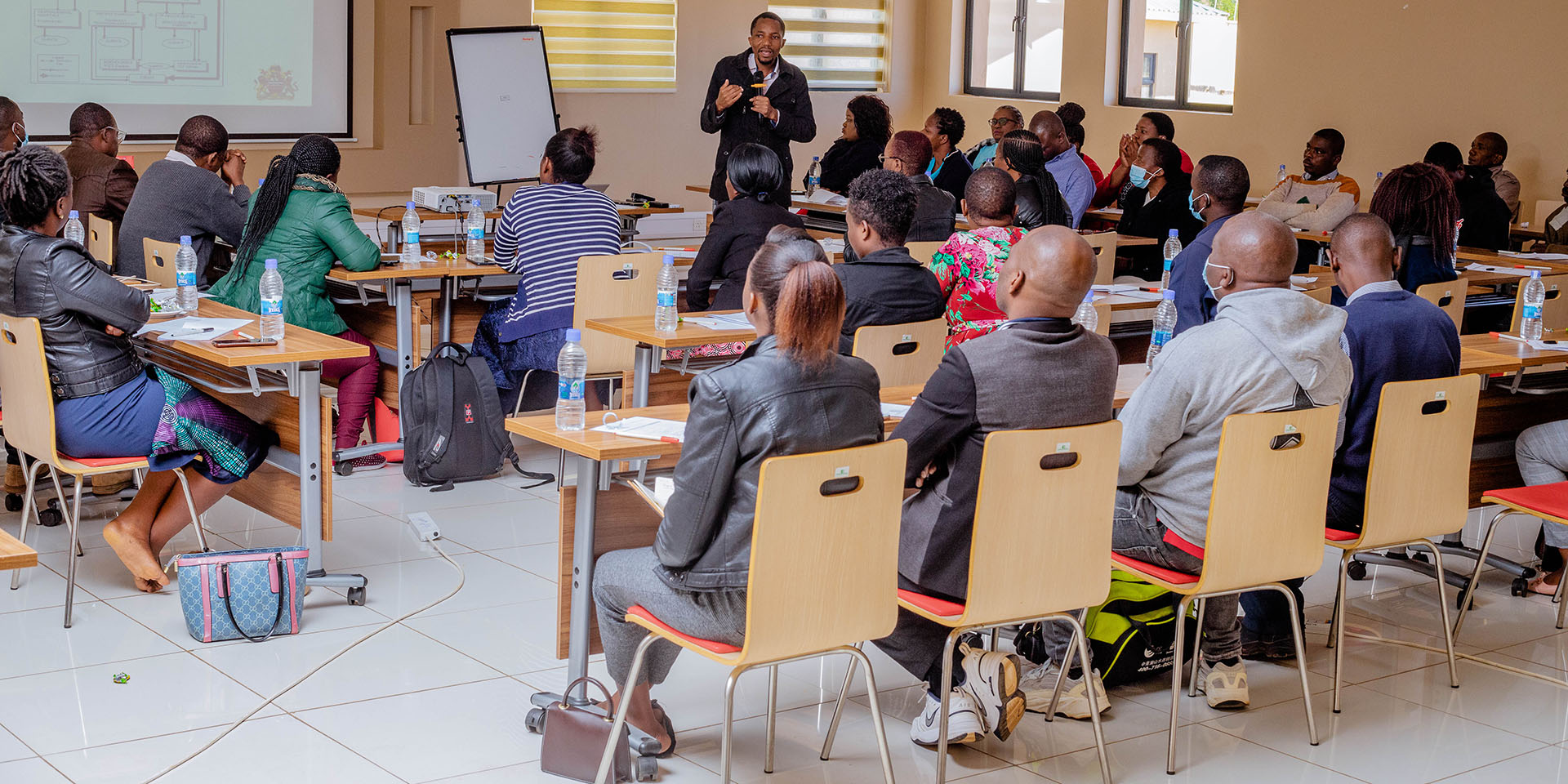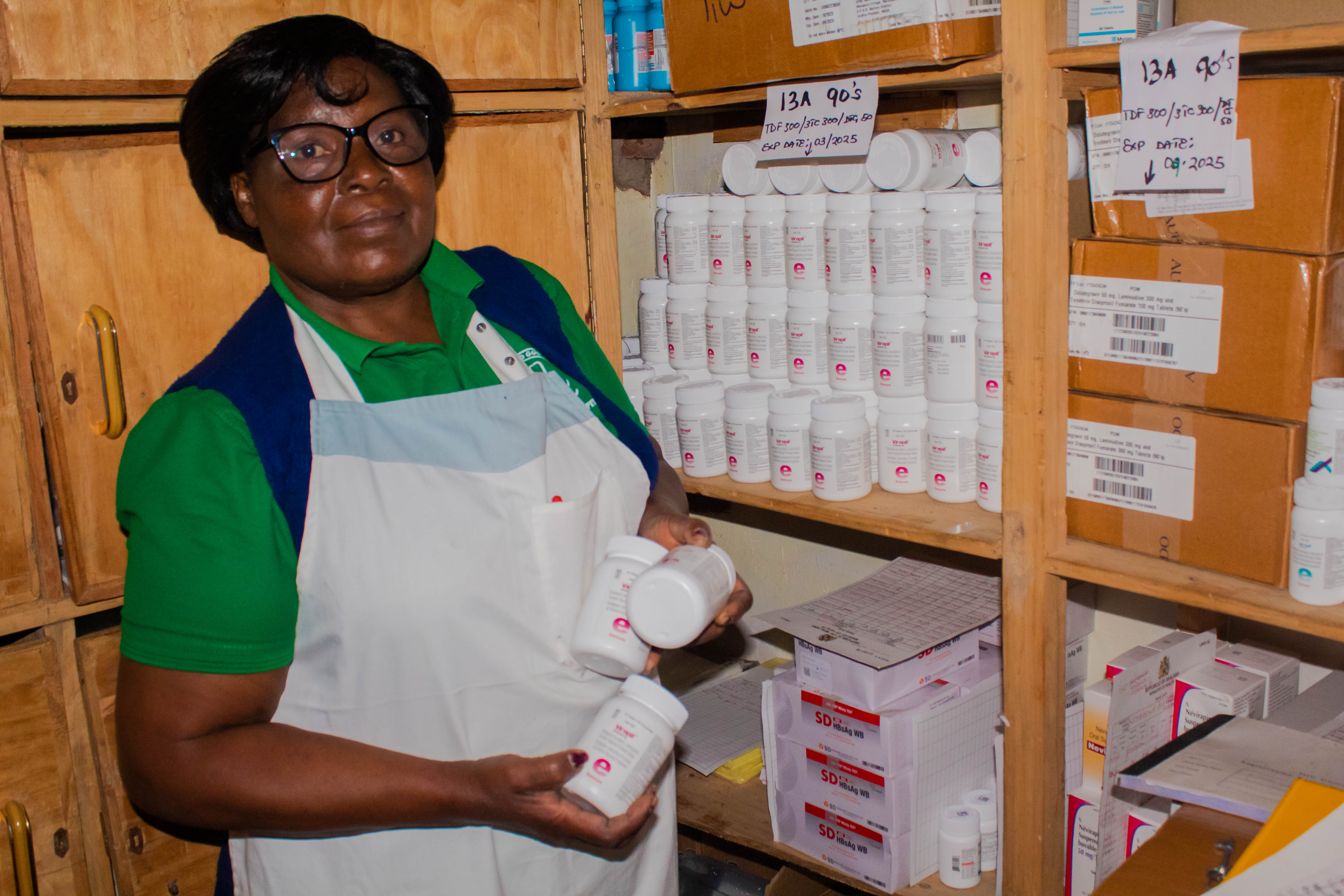
Elizabeth Numero is a nurse and midwife who manages Antiretroviral Therapy (ART) commodities at Liwonde Private Clinic drug store in the Machinga district of Malawi. Once a disorganized drug store with poor record keeping, it is now a well-organized and properly labelled pharmacy, thanks to the training she received on supply chain management from the USAID Global Health Supply Chain Program-Procurement and Supply Management (GHSC-PSM) project.
From 2022-2023, GHSC-PSM teamed up with the Ministry of Health (MOH) to train 545 health facility personnel in supply chain management to improve their skills in commodity management, data recording, and reporting. The training followed observations during field supervision visits which indicated that most NGO and privately owned clinics were experiencing challenges in organizing their drug stores and assessing real stock status due to poor documentation.
The training enabled Elizabeth to improve record keeping, arrange medical commodities according to classes, and make sure that commodities that are close to expiring appear at the front of the shelf to facilitate application of the first-to-expire, first out (FEFO) principle which reduces commodity expiries.
According to Elizabeth, the training helped her to understand pharmacy practice; “now I can adequately document quantity of incoming supplies, their respective invoices, and update existing records. This has gone a long way in improving reporting of stock at this facility,” she narrates with a smile on her face.
She further adds that the training helped her assist colleagues with compliance to the FEFO principle by pasting handwritten expiry date stickers on the shelves. This helps other health workers in the pharmacy to know what commodities they need to give out first, even when she is not there.
At a national level, this training has assisted the Ministry of Health to increase product availability and reduce wastage. With better stock management, drug store managers like Elizabeth can identify commodities that are overstocked and at risk of expiry. The Ministry of Health is then able to relocate these drugs to other facilities where they are needed so that people living with HIV have uninterrupted access to life-prolonging medicines.
“When I joined, I found lots of drugs which were not in use. After the training, I realized that these drugs would expire soon, so we wrote a relocation form to the District Health Office who came to collect the commodities, for use at other facilities,” says Elizabeth.

Elizabeth Numero holds ART commodities at Liwonde Private Clinic in Malawi
The MOH is happy with how the training has brought order to private health facilities, stating that it has helped inculcate pharmaceutical knowledge in those managing drugstores.
“The training has positively impacted on commodity management in the private sector health facilities as we have imparted basic commodity management principles to the non-pharmaceutical staff. They are now well conversant of pharmacy best practices, which include that they must sign and file delivery notes once they receive Health commodities and conducting a physical inventory count must at the end of each month. This brought order as there was chaos before the training. We are confident that this will contribute to improved commodity security in the long run” says Bernadetta Chibwana, Principal Pharmacist in the Ministry of Health.
Following the training, the reporting rate for HIV commodities across NGOs, private, and public facilities in the logistics management information system (LMIS) has significantly improved, from 79% in June 2022 to 88% in September 2024.
Another notable effect of the training is the inclusion of 47 NGO and private owned health facilities, which were previously not reporting on ART, in the MOH electronic LMIS. They are now reporting consistently, enhancing data visibility which has been crucial in enabling timely ordering and resupply of commodities to improve service delivery point stock availability and minimizing potential waste through expiries, thereby strengthening overall commodity security.
Elizabeth’s story is just one example of how this training is transforming Malawi’s health supply chain for the better. With the skills she and others have gained, drug stores and health facilities are more organized, stockouts are reduced, and critical HIV treatments reach the people who need them most. The commitment of GHSC-PSM and the Ministry of Health to empowering health workers is setting the entire country’s supply chain—and the communities it serves—on a path toward a more secure, reliable future. Through continued learning and collaboration, professionals like Elizabeth are building a stronger foundation for health care delivery across Malawi, ensuring healthier lives and greater access to life-saving medicines for years to come.